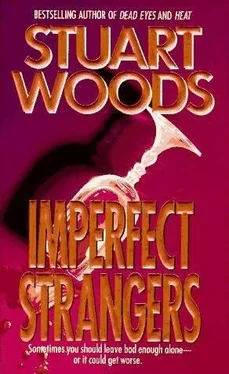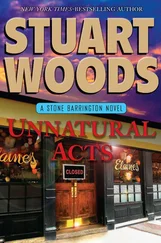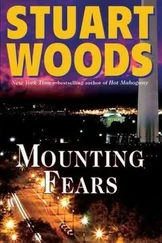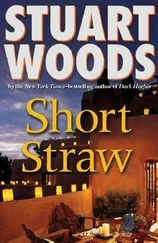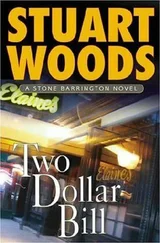"Agreed."
"We should be able to get you some money back, too. The things your wife chose-both the furniture and the pictures-while maybe not to your taste or mine, are auctionable. She obviously wasn't stupid."
"No, she wasn't. What do you think I could get for them?"
"Two or three hundred thousand, I should think."
"Whatever you can get for them at auction, I'll add to my budget."
She smiled broadly. "I like your style, Mr. Kinsolving."
"Sandy."
She raised her glass. "Cara."
"Cara, would you like me to fix us some dinner here, or would you rather go out?"
"I'll take my chances with you."
"Come into the kitchen; I'll see what's in the larder."
Sandy found some smoked salmon and eggs in the refrigerator, and some caviar, too. He scrambled the eggs with the salmon, made some toast, and served the caviar as an appetizer, straight, with little silver spoons. "Would you prefer champagne or vodka with your caviar?" he asked.
"Champagne, please."
He went to the wine cabinet and found a bottle of Krug '83. "This should have enough age on it to make it interesting," he said, working the cork from the bottle.
She tasted it. "Mmmmm," she breathed. "What's the word I'm looking for?"
"Yeasty," he said.
"Yes. You are in the wine business, aren't you?"
"I am, for my sins."
"Well, you must have sinned a lot to be doing this well at choosing drink," she said, raising her glass.
"Thank you, ma'am."
They ate the caviar, then the eggs and salmon.
"It all goes together so beautifully," she said.
"Thank you; it was meant to."
"Tell me something about your background," she said.
"Grew up in Weston, Connecticut, went to Exeter and Amherst, met my wife in college, got her pregnant, married her-in that order-produced a son. Advertising for a couple of years, then joined my father-in-law's liquor business and eventually started the wine division. He died six weeks ago and left me the wine division."
"When did your wife die?"
"Five weeks ago."
"How?"
"She was murdered."
Cara put down her glass. "Do you mind telling me about it?"
He related the events of that Saturday night.
"That's terrible," she said.
"Yes, it was."
"Were you devastated?"
"I was numb. I have, in fact, remained numb, until tonight."
"What do you mean?"
"I mean that this dinner is the first pleasant social interaction I've had with another human being since it happened."
"Were you and your wife very close?"
"We had grown apart over a very long time."
"Do you miss her?"
"No, I do not. I'm glad to have my son, though; he's finishing up a residency in cardiology at Lenox Hill Hospital."
"You're a very direct man, Sandy."
"It's a waste of time to be any other way. Now you."
"I told you I grew up in San Francisco. Went to Berkeley, studied architecture, but discovered I was more interested in the inside of buildings than their structures. Joined my father's firm as a designer; when he died and the firm closed, I went to another."
"Ever married?"
"Once; for three years. A mistake."
"Whose?"
"Mine."
"You're pretty direct, too, Cara."
"We're in agreement on that point," she replied.
"Good. Cara, I'm very attracted to you. In fact, I'd be very pleased if you would come to bed with me right now."
She shook her head. "Too soon," she said. "But please don't think that's a flat turndown. You're a very attractive man."
"Thank you."
"I want your job, Sandy, but I won't sleep with you to get it."
"You've got it, on your qualifications and what you've suggested to me. As beautiful as you are, I wouldn't spend a million dollars just to get you into the sack. You can decide whether you want to sleep with me quite independently of the job."
She smiled, but said nothing.
"Would you like some coffee?"
She glanced at her watch. "Thank you, no. I've had a long day, as you have, and I could use some rest." She stood up. "Do you mind if I go now?"
"Yes, but I can live with it."
"I'll come back tomorrow when you're not here and make a floor plan and some rough sketches. Will you tell the doorman to let me in?"
"Yes, of course."
"I'll have something for you to look at in a week or so."
"I wouldn't like it to be that long before I see you again. How about dinner this weekend?"
"Saturday is good for me."
"And for me."
He retrieved her portfolio and walked her to the door.
"Good night," she said, offering her hand.
He took it. "Good night, and go safely. I'll look forward to Saturday," he said.
"So will I," she replied.
Sandy sat in Sam Warren's office at Mayfair Trust and listened to the presentation prepared by a younger associate at the bank, on the acreage, buildings, equipment, replanting and stock at the Larsen Winery. When the young man had finished, Warren took over.
"Here's where we are," the banker said. "Larsen wants twelve million for the property."
"What's it worth, in your opinion?" Sandy asked.
"Like anything else, it's worth what somebody will pay for it. Fortunately for you, because of the costs and uncertainties involved in replanting with phyloxera-resistant vines, the industry is in a period of retrenchment, and there's not likely to be a lot of bidding on the property. Our research has uncovered what Larsen actually has invested in the property, and, of course, what he owes, and I think what we need to come up with is a maximum amount we're willing to offer that would get him out of the business without a loss on his investment; actually, a small profit."
"And what is that number?"
"Eight million eight; we think that's about right."
"I see."
"I'd suggest offering eight, then working your way up in negotiations. It's important for him to understand right off that you're not going to pay anything near his asking price."
"I agree."
"There's another important consideration," Warren said.
"What's that?"
"Larsen employs a man who is, by all reports, a very fine winemaker. His name is Bernini, Italian-American, forty-two, good track record. He and Larsen have not hit it off, Larsen being so technically oriented, and in order for the vineyard to be worth the eight million eight, you're going to have to be able to sign him to a long-term contract at very good money We feel that Bernini is very important to the operation."
"Has anyone talked to him?"
"Not yet. I think it would be best if you did that personally. We can structure an earnings and stock option package for him that would make it attractive for him to stay, if you can offer him a lot more freedom to pursue his own methods."
"Did you say stock options?"
"Yes. He's going to have to have the prospect of participation down the line somewhere. It's manageable, and we recommend such a course of action. The autocratic, one-hundred-percent owner is a thing of the past; if you want good people you're going to have to allow them to buy in."
"All right."
"My suggestion is that you contact Bernini, tell him you're interested in buying, then hand him off to us; we'll talk with his representative and structure an offer to the man, then we'll be in a position to negotiate seriously with Larsen." Warren handed him a slip of paper. "Here's his phone number; it's your call as to whether to go out there and see him, or just talk to him on the phone."
"Okay, I'll think about that," Sandy said. "If I pay eight million eight for the property, is that going to leave me enough capital to expand into San Francisco and operate the combined businesses?"
"We feel you can do it without incurring debt, but we think that we should set up a line of credit, just in case. We don't want you to feel pinched. Personally, my advice would be to acquire the vineyard, consolidate the operations and identity of the London and New York stores to the maximum extent possible, then establish good cash flow and operating profits before going into San Francisco. We're only talking about a period of a year, possibly two, before you make the San Francisco move."
Читать дальше
